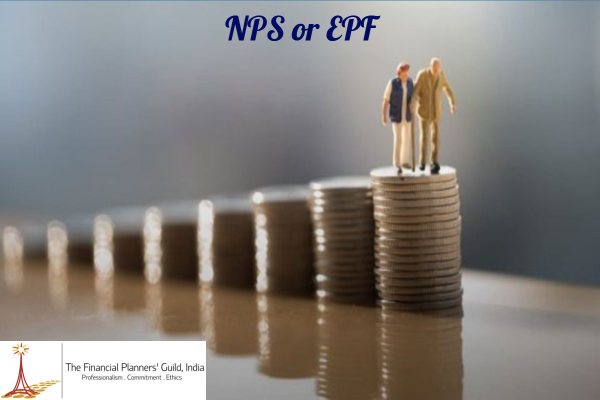
Budget 2015 made an interesting proposal on Employee Provident Fund. It is proposed that employee should be given option of making contribution either in EPF or New Pension Scheme. Although it is yet to be passed in the bill and especially without any opposition from EPFO, the debate on which is better is creating a lot of confusion among investors. Although both avenues are aimed at long term investment there are good number of differences which is resulting into a hard choice.

Let’s understand the two options and see what you should do if the proposal goes through-
NPS
New pension scheme is a defined contribution benefit scheme aimed at accumulating a good corpus for your retirement. In this scheme you decide the contribution amount and accordingly invest. Here the underline investments are equity and debt wherein you are given a choice of choosing your asset allocation. Maximum 50% of the contribution is allowed to invest in equity and the rest can go in gilt and corporate bonds. You can decide the exposure based on your risk tolerance. There is auto allocation feature where the allocation in equity keeps decreasing with your age. It primarily suited for investors who are not well conversant of doing an asset allocation. There are 6 fund managers managing the NPS corpus and you can choose for your corpus. There is flexibility for you to change fund manager.
EPF
Employee provident fund is also a defined contribution scheme also aimed at long term accumulation. A part of your basic salary goes towards this scheme and the employer contributes equally to it. Here the underline investment of the corpus is government securities and you earn interest on the total contributions. The interest is declared by EPFO every year and is fixed once declared.
What’s The Difference?
There is huge difference between the two schemes and that’s why the question of comparison is being raised. EPF has been a fixed interest earning scheme and moving to a variable return will certainly be difficult for investors. Here is what differentiate the two schemes-
Contributions
Contributions to EPF are fixed as they are part of your basic salary. If you wish to do more than that you make it through voluntarily provident fund. But EPF is not open to everyone. That’s not so with NPS. Anyone can start with NPS account today. The employee can invest much like EPF and part of the salary will be contributed to this scheme while you can also decide your contributions.
Investment
There is a great difference between the two for underline investment. EPF money is invested entirely in government securities which is the main reason of the proposal as the fixed returns are not considered to be stable. Although government has amended the act and allowed 5-15% of the corpus going toward equity markets EPFO has to still take that decision concerned on the volatility of the returns. Contrary to this NPS is a market linked product much like a mutual fund. The underline investment are equity, government securities and corporate bonds where you as an Investor decided how much to allocate to which asset class.
Returns
The returns in EPF are almost fixed since it is in the form of interest and that too compounded. This interest is declared by EPFO every year. Not so in NPS where you will earn based on the performance of your asset allocation. So you need to manage your investments in NPS yourself to generate the desired returns which is not the case with EPF.
Taxability
This is where EPF is scoring higher than NPS. The interest you earn is tax free in your hand and you get Sec 80C deduction on the contributions. The maturity or withdrawal after five years of service comes without any tax liability. For any compounded earnings with interest more than inflation the attractiveness cannot be missed. Contrary to this NPS enjoys the same tax deduction on contributions with increase of R 50000 this year but the maturity is taxable. Put simply EPF falls under EEE regime while NPS will fall under EET. Unless this difference is reduced EPF will find more favors with investors than NPS although the later has capability of generating higher returns.
Liquidity
One of the other attractiveness fort EPF is that it has higher liquidity. It can be withdrawn at any time and after 5 year the withdrawal it is completely tax exempted. This find favors with most employees who have to switch jobs and it do not wish to transfer. This is not so in NPS. A withdrawal window is given but only a specific amount. The entire corpus withdrawal is not there. What makes EPF attractive is that one can estimate the fund receivable easily but not so in NPS where the corpus accumulation depends much on the performance of funds.
If you take all the above factors in consideration EPF does have higher attraction and will be preferred even if the choice is given. But EPF has been used less for retirement and more for intermediate needs which is also a major factor for the government coming with this proposal. The taxability issue will be addressed in the future given the inclination of the government towards this option. Till then the choice of investing in NPS will be the additional tax deduction.
FPG India ©2024. All Rights Reserved.
Designed & Developed by W3M Technoz